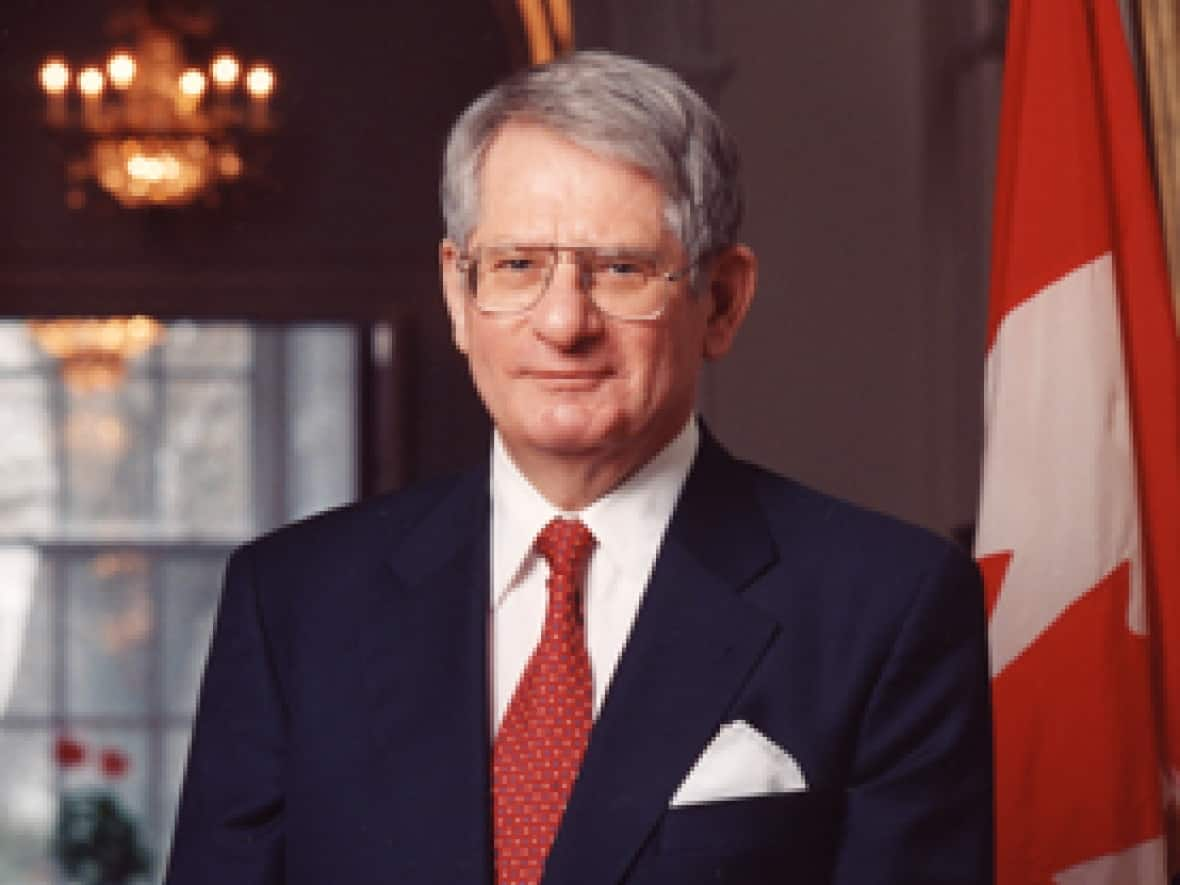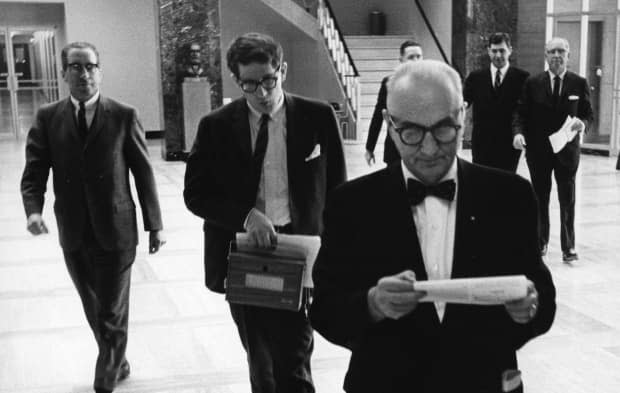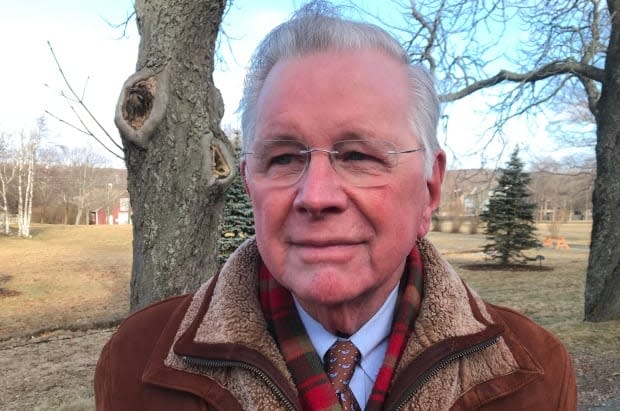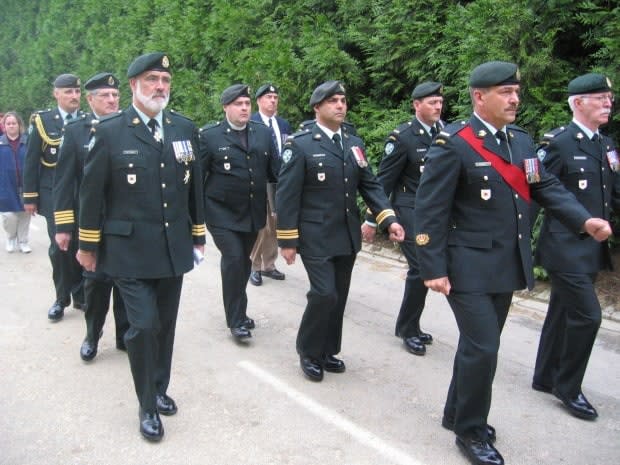Edward Roberts, former N.L. lieutenant-governor and prominent politician, dead at 81

Edward Roberts, Newfoundland and Labrador's 11th lieutenant-governor, a political stalwart during much of the province's post-Confederation era and a passionate student of history, has died.
Roberts died Friday. He was 81.
His legacy as a political leader who helped direct reforms in health, education, social services and government administration, and his long career as a lawyer and businessman, distinguishes Roberts as one of Newfoundland and Labrador's most notable citizens, says former premier Roger Grimes.
"The phrase used among politicians was that Ed Roberts will go down as the best premier we never had," said Grimes.
Roberts's passing prompted tributes from other notable leaders, both past and present.
Another former Liberal premier, Clyde Wells, described Roberts's contributions to the province as "substantial and always principled, and always with concern for the people he was thinking about."
Seamus O'Regan, the Liberal MP for St. John's South-Mount Pearl, and the federal labour minister, described Roberts's passing as "a deep loss."
"I don't know if there ever will be anybody like him," he said.
O'Regan began his political career as an executive assistant to Roberts in the early 1990s.
"What I got out of that was an incredible education from perhaps one of the greatest teachers and students of Newfoundland and Labrador's history that we've ever had," said O'Regan.
A fractured Liberal party and a missed opportunity
Roberts cut his political teeth teeth as an aide to then premier Joey Smallwood in the 1960s, and later served in his cabinet. He became Liberal leader in the early 1970s, but his aspirations to lead the province were cut short, in part by Smallwood himself, who formed a breakaway party that split the Liberal vote in the 1975 general election.
"That was regrettable because Newfoundland missed having a very, very good and able premier," said Wells.
Grimes, who served as premier from 2001 to 2003, became friends with Roberts in the early 1970s.
"He was Intelligent and well read, and so really seriously committed to trying to make sure the right things were done for the province," Grimes told CBC News.
"It's almost like he should have been the premier, but since that did not happen, he was certainly born to be the lieutenant-governor."

A lifelong resident of the St. John's area, Roberts concluded a six-year term as the province's vice-regal representative in February 2008.
He maintained a fairly low profile since. The COVID-19 pandemic kept Roberts and his wife, lawyer Eve Roberts, largely confined to their home for the past two years.
A mainland education, but a rural politician
Roberts was the son of Harry and Katharine Roberts. His father was a prominent medical doctor in St. John's who established a leading pharmaceutical distribution company in the province and owned the Battery Hotel.
Roberts completed his secondary education at St. Andrew's College, an independent and prestigious boys' school in Ontario, and went on to earn a law degree at the University of Toronto in 1964.
Returning home to be Smallwood's first executive assistant, Roberts won his first of eight election victories in the fall of 1966 in the Northern Peninsula district of White Bay North.
He went on to have a political career that spanned four decades, and saw him linked to many pivotal moments in the province's history.
He had a reputation as a sharp-tongued debater — those closest to him called him "Scrap" — who thrived on the cut and thrust of parliamentary style politics, said Wells, who served as premier from 1989 to 1996, and was either alongside or opposite Roberts for some of the most intense political debates of the last six decades.

"He had a great intellect. A very bright man. And could respond very quickly, and see things very quickly, and could at times have a somewhat acerbic tongue in his comment. But he was never unkind," said Wells.
"I never had anything other than the utmost respect for his intelligence and competence, and his integrity and principle."
Smallwood and the Liberal reformers
With Smallwood having exited the political arena, and the Progressive Conservatives in government, Roberts became leader of the Liberal party in early 1972 with a convincing first-ballot victory over three other candidates.
But after many years in power, the Liberals were deeply fractured, and Smallwood re-emerged and challenged Roberts for the leadership less than three years later. Roberts defeated Smallwood on the second ballot.
But Smallwood refused to leave the scene, launching the Liberal Reform Party and entering the 1975 election with a slate of candidates.
Smallwood's movement split the Liberal vote, allowing the PCs and Premier Frank Moores to retain power with 30 of the 51 districts up for grabs.
In my view he almost certainly would have won that election had not Mr. Smallwood decided he still wanted to be premier. - Clyde Wells
"In my view he almost certainly would have won that election had not Mr. Smallwood decided he still wanted to be premier," said Wells, who, along with then Liberal John Crosbie, famously broke ranks with Smallwood in the late 1960s.
"When you total up the votes the independent Liberals got with the votes that the Liberal party under Ed Roberts got, they certainly would have had a clear majority in the House, except for the way in which Mr. Smallwood caused the votes to be divided."
An unelected cabinet minister
After many years in opposition, Roberts left politics in 1985 to focus on his legal practice. He was the senior partner of Halley Hunt, a prominent St. John's firm.
Clyde Wells lobbied hard to convince Roberts to run in the 1989 election, which saw the Liberals win control of the House of Assembly for the first time since 1971, but Roberts declined.
In early 1992, however, Wells invited the then unelected Roberts into his cabinet as attorney general, minister of justice and House leader, and Roberts accepted.
"My life as premier was made easier when he accepted my invitation to become minister of justice," said Wells.
Roberts was elected in a byelection a few months later in the former Labrador district of Naskaupi, and re-elected for a final time in 1993, before retiring from politics in early 1996, shortly after Wells retired.
Roberts served briefly in the cabinet of Wells's successor, Brian Tobin.
"I don't know of many who did not have respect for him," said Wells.
A fresh approach to the role of viceregal
Roberts had deep connections with high-powered Liberals in Ottawa, and made no secret about his desire to take up residence at Government House. In 2002, on the advice of then prime minister Jean Chrètien, he was appointed lieutenant-governor.
"It's almost like he was born to be the lieutenant-governor," said Grimes, who was premier at the time of Roberts's appointment.
"He fit the role so perfectly and was so knowledgeable about everything Newfoundland and Labrador and such a great believer and supporter of our province."
Grimes said Roberts transformed the role of viceregal by opening Government House up to the public in ways not seen before, allowing the media access and even opening up about his love of country music.
"Ed wanted to let everyone know the people owned this place. He wanted to make them realize this was a place where someone lived," said Grimes.
Roberts also served as honorary colonel of the Royal Newfoundland Regiment, which he was especially proud of because of his passion for history, and the regiment's bloody role in the first world war, said O'Regan.
A lifelong learner, with a passion for history
Roberts was invested in 2010 as a Member of the Order of Canada. His investiture statement described him as "a model of duty, leadership and achievement," and that he "oversaw the implementation of the provincial medicare scheme, as well as the creation of a new tertiary care hospital in St. John's and a faculty of medicine at Memorial University."
He was also presented with the Order of Newfoundland in 2004.
Prior to being appointed lieutenant governor by in 2002, Roberts served for nearly six years as chairman of the board of regents of Memorial University of Newfoundland.
The university conferred the honorary degree of doctor of laws on Roberts in 2003.

During his time as the queen's representative, Roberts earned a master's degree in Newfoundland history from Memorial, in keeping with his keen interest in the economic, social and political issues in his native province.
"He wanted to know everything about everything. He wanted to know how we got where we are today," said Grimes.
He's also been praised for his support of military veterans and his involvement with the Royal Newfoundland Regiment.
Wells said the loss is a blow for the province.
"The people of the province lose the benefit of his thinking, his tolerance and understanding and fair-mindedness," he said.


